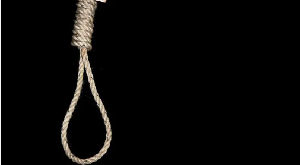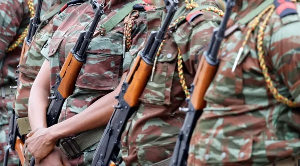Amnesty International say di number of pipo wey chop execution across di world rise sharply for 2024.
According to di NGO latest report on death sentences and executions, for 2024 dem execute a total of 1,518 pipo, 32% more dan 2023, despite a reduction in di number of kontris wey dey implement di death penalty.
Amnesty data show say di number of deaths wey dem record last year na di highest since 2015, while di number of kontris involved fall from 16 to 15.
Di kontri wey dey believed to execute di most pipo for di world na China, but dem no get any definitive number for recorded executions in di kontri.
Dis na becos e no get official data sake of say China treat dis statistics as a state secret, Amnesty tok.
Vietnam and North Korea na two more kontris wey dey use di death penalty extensively, but dem no dey reveal di number of executions.
Executions wey dey known pass
Iran lead di world in terms of known executions.
"Iran, Iraq and Saudi Arabia dey responsible for di sharp increase in deaths last year, as dem carry out ova 91% of known executions, violating human rights and wickedly taking pipo lives for drug-related and terrorism charges," Agnès Callamard, Amnesty International Secretary General tok.
For 2024, at least 972 pipo - wey include 30 women - Iran put dem to death, according to di report. For 2023 di corresponding figure na 853.
Iranian human rights activists link dis increase to internal political turmoil.
"We don see di number of executions increase afta major protests and for periods of uncertainty," Roya Boroumand, Executive Director of Aborrahman Boroumand Center for Human Rights for Iran explain.
Boroumand point out say 12 women dey executed for 2022 and 25 for 2023. Some of dem dey convicted for drug related offenses. She say critics of di regime too dey targeted.
"Several women activists don chop death sentenced - an effective warning to Iranian women wey dey oppose di discriminatory laws and practices," Boroumand told tell di BBC.
Iran regional neighbour Saudi Arabia execute 345 pipo, and Iraq come next wit 63.
Amnesty say Iran and Somali each execute four pipo under di age of 18.
Iran and Afghanistan na di two kontris wey carry out public executions for 2024.
'Thousands of executions'
Di Amnesty figures get a notable caveat, howeva.
"Our global figures for 2024 no include di thousands of executions and death sentences wey we believe say e kontinu to take place for China," Chiara Sangiorgio, Amnesty International sabi pesin on di death penalty tell di BBC. "Death penalty figure remain classified as a state secret, but di information wey we gada bin paint a harrowing picture."
Amnesty believe say China dey apply death penalty for corruption and drug trafficking in violation of a UN resolution, wey tok say di imposition of di death penalty gatz dey restricted to di "most serious crimes", wey di UN Human Rights Committee define as dose wey dey involved in intentional killing.
Crimes wey no result into direct and intentional death, such as drug and sexual offences, no meet dat criteria.
"We also see say di authorities kontinu to resort to executions as a tool for weaponry of state control, to send a message say crime and dissent no go dey tolerated," Sangiorgio say.
China get a long history of using capital punishment. For 1983 e implement a "strike hard" policy, wey dey aim at criminal gangs.
Media reports suggest say some executions na for non-lethal crimes like stealing cattle or vehicles.
Drug traffickers dey specifically targeted. Amnesty report for 1996 say "International Anti-drugs Day on 26 June dey marked by di execution of more dan 230 pipo in one day for several cities".
Death penalty dey reduce?
Professor Michelle Miao from di Chinese University of Hong Kong don look into different factors wey dey contribute to di high number of death penalties for recent years. She tok to di BBC about her work and explain why e no dey easy to estimate number of judicial executions for China.
"Like many kontris wit capital punishment, China no dey publish comprehensive execution data. My research suggest dis from both policy traditions and di sensitive nature of di subject," Prof Miao say.
For her research, she interview 40 Chinese judges and an equal number of defence lawyers. Her conclusions find a lack of consistency for di death convictions and also ambiguity in law.
"Di Criminal Law provide say suspended death sentences suppose apply only "wen immediate execution dey unnecessary". But which kain criteria make Chinese judges use to define dis necessity?" Prof Miao ask. "More dan two-thirds of my interviewees, wey include Supreme People Court judges dey unable to provide a precise ansa to dis question."
Di US-based rights group Dui Hua say di total number of executions for China don come down from 12,000 for 2002 to about 2,000 for 2018. E no give any details for di subsequent years. Dui Hua refuse a BBC request to comment further about di present situation for China.
Miao relate dis fall for estimated executions to a series of reforms for di criminal justice system wey dem introduce ova di last two decades. A convict fit now get two appeals instead of one, and while di Chinese Penal Code of 1979 listed 74 offences punishable by death, dem revised dis one down for 2011 and 2015.
Currently, 46 crimes fit result for a death sentence.
"Murders and drug-related offenses na di two major crimes wey dey lead to di death penalty," Prof Miao say.
She dey optimistic about di coming years, believing say rapid changes for technology, preventive law enforcement and improving living standards for China go reduce crimes.
"Sake of di reduction for cases wey involve drug-related crimes - such as trafficking, smuggling, manufacturing, and transportation - as well as murder, and di likelihood of dis trend to kontinue, we fit expect a reduction for overall executions in di coming years."
Conviction rate
Chinese courts handle a high volume of cases, and conviction rates dey also veri high. According to a report published by Dui Hua, "only 631 individuals out of di 1,431,585 defendants dey not guilty by criminal courts for 2022".
"Di conviction rate for 2022 na 99.95 percent, a record high according to statistics for di China Law Yearbook," according to an article in Dui Hua.
Anoda academic paper published by di International Journal of Law, Crime and Justice note say a court for Wenzhou city, Zhejiang province, convict evri single defendant between 1995 and 1999.
Prof Miao say conviction rates dey high becos of di vetting process.
"Throughout di Chinese criminal justice process, cases undergo pre-trial screening. Only dose deemed likely to result in convictions dey advanced through trials due to judicial risk aversion and a performance evaluation system wey prosecutors fit filter out weak cases," she explain.
"Dis apply not only to death penalty cases but to criminal cases in general."
Wit such a high conviction rate, miscarriages of justice fit dey expected to occur. For 2016, 27 officials dey penalised for di wrongful execution of a teenager wey chop accuse of rape and murder, and dem later pay di 18-year-old parents compensation.
China no dey unique for such a high conviction rate – neighbouring kontri Japan wit democracy, fit also boast of more dan 99% convictions afta indictment. Japan neva execute anyone since July 2022, howeva.
Despite international concerns about di numbers of executions for China, Prof Miao say public opinion inside di kontri dey largely supportive of di death penalty.
BBC Pidgin of Tuesday, 8 April 2025
Source: BBC
















